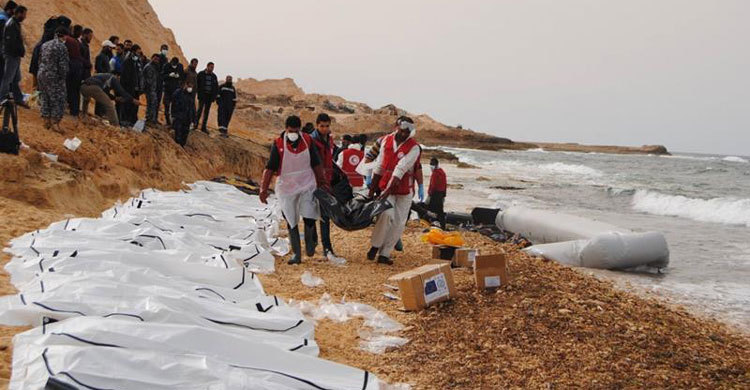525 refugees die at sea in first few weeks of 2017

More refugees have died in the Mediterranean over the first nine weeks of this year compared with the same period in 2016, according to the International Organization for Migration (IOM).
From January 1 to March 9, at least 521 people drowned while attempting to cross the treacherous sea compared with 471 in the same period a year ago. At least another four refugees died on Friday, bringing the 2017 death toll to 525 people, according to IOM.
The figures raised alarm on Tuesday among human rights organisations, which have repeatedly called for safer passages.
The rising deaths came as the number of people making the dangerous crossing from Libya more than doubled, with 13,439 arriving in Italy compared with 5,273 a year earlier.
IOM spokesman Flavio Di Giacomo said most migrants leaving Libya came from Guinea, Nigeria, Cote d`Ivoire, and Bangladesh.
Judith Sunderland, associate director for Europe at Human Rights Watch (HRW), told Al Jazeera it was possible that a rush effect was fuelling more crossings, with many panicked over new policies between Libya, Italy and the EU aimed at stemming the flow.
In February, EU leaders inked a deal to give 200m euro ($215m) to Libya`s fragile government to stop migrant boats in the country`s territorial waters.
"One interpretation is that smugglers and migrants are really in a rush to try and get people across the sea before those measures, before a clampdown, Sunderland said.
Along with impending border control efforts, refugees were subject to increasingly cruel treatment by smugglers, including being packed into flimsier boats, Sunderland said.
"Conditions are ripe for more tragedies at sea."
`EU should focus on search and rescue`
In March 2016, the Balkan route was permanently shut, trapping tens of thousands of asylum seekers in Greece and slowing Aegean Sea crossings to a trickle. The route between Libya and Italy remains busy.
One of the EU`s concerns, said Sunderland, is ensuring refugee boats do not enter international waters because then European vessels are obligated to bring those on board to Europe.
"Certainly we believe that migration cooperation with Libya is deeply problematic," she said. "[The EU] should be doing a lot more to get people out of Libya in a safe way and a lawful way so they don`t have to risk their lives to do so... Clearly, they`re not keen to do that."
Over the past three years, the number of refugees who died at sea has risen sharply.
In 2016, more than 5,000 people lost their lives at sea - an annual record - as they took on perilous journeys to escape war, poverty, and persecution - often all three. In 2015, some 3,771 refugees died while crossing the Mediterranean, up from 3,279 deaths the year before.
"We believe that the EU should continue to focus on search and rescue ... rather than trying to prevent their flight from the dangers and violence they endure [in Libya]," said Elisa De Pieri, a Europe researcher at Amnesty International.
"It is clear that from Libya we are seeing a mixed flow of refugees and migrants escaping extreme poverty. The main problem is that there are no safe and legal routes into Europe neither for refugees nor for migrants," said De Pieri.
A rising number of Bangladeshi refugees are trying to reach Europe, according to the latest IOM data.
IOM field staff spoke with some of the 1,303 Bangladeshis who disembarked at landing points in Sicily and Apulia in Italy.
From Bangladesh, some they said they travelled by air to Dubai, Turkey and then Libya, from where they attempt the sea crossing.
Along with a payment to "agents" for a working visa, the total journey cost is between $14,000 and $15,000.
Others had already been living and working in Libya for more than one year, and were apparently fleeing the country`s instable economy and security situation.
According to UN figures, more than 40 percent of Bangladesh`s population lives below the international poverty line of $1.25 per day.
A common argument against allowing economic migrants is that they do not face physical danger from war or conflict.
"[But] under international law, refugees` claims should be examined individually on their merit. People can be subjected to persecution in any country," said De Pieri.
HRW`s Sunderland also warned against "blanket categorisation about people from Bangladesh as economic migrants without protection needs".
"In every case, everybody should have a fair chance to have individual circumstances examined," said Sunderland.
"We hope that we will have leaders who put human rights concerns at the heart. [But] it`s hard to remain hopeful given the climate of Europe. We are seeing the doors slamming shut even more."
Source: Aljazeera
